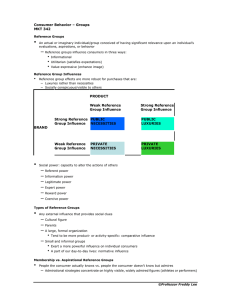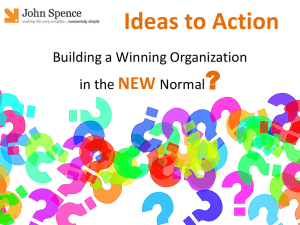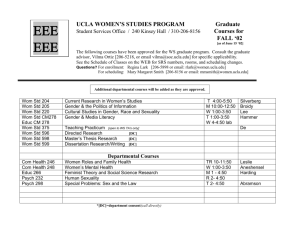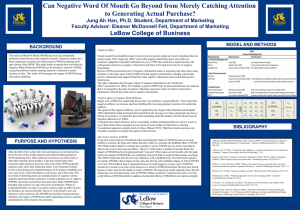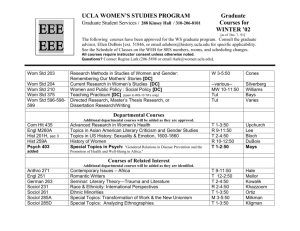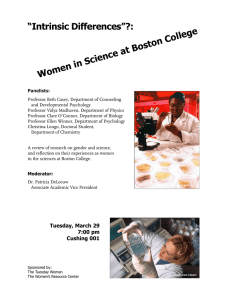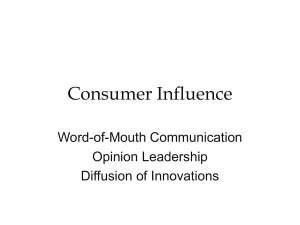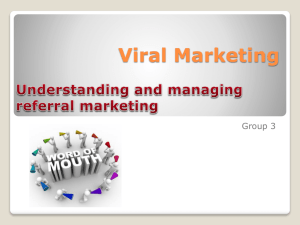The Value of Managed Word-of-Mouth Programs
advertisement
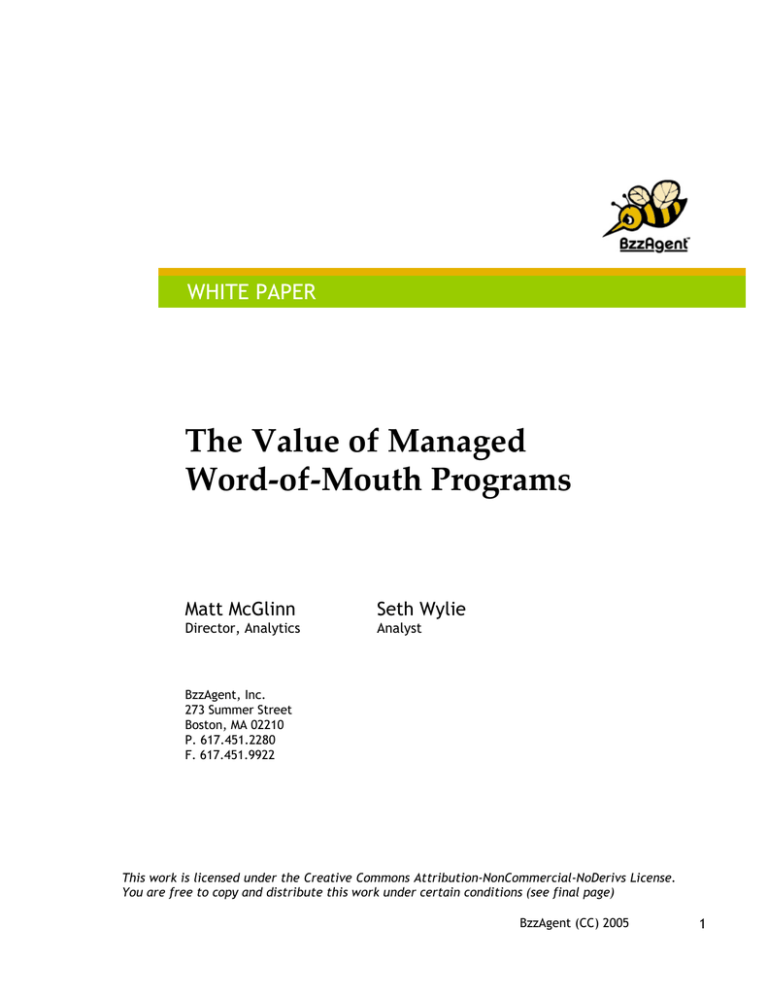
WHITE PAPER The Value of Managed Word-of-Mouth Programs Matt McGlinn Seth Wylie Director, Analytics Analyst BzzAgent, Inc. 273 Summer Street Boston, MA 02210 P. 617.451.2280 F. 617.451.9922 This work is licensed under the Creative Commons Attribution-NonCommercial-NoDerivs License. You are free to copy and distribute this work under certain conditions (see final page) BzzAgent (CC) 2005 1 WHITE PAPER The Value of Managed Word-of-Mouth Programs Introduction W ord-of-Mouth (WOM) has grown in In 2005, Dr. Walter Carl, Assistant Professor of popularity over the past several years as Communication Studies at Northeastern a marketing and research medium. Marketers University, approached BzzAgent, a WOM seeking to find new methods for reaching marketing and research firm, about conducting customers and communicating with them have a study of WOM marketing and issues around wondered if word-of-mouth could provide a the rising industry. potential solution to the dwindling return of among other topics, differences in behavior and traditional marketing platforms. results between organized WOM programs and Dr. Carl investigated, naturally occurring WOM. Since the beginning of organized marketing programs, marketers viewed word-of-mouth as Over 1,000 BzzAgents and an additional an incredibly valuable, yet uncontrollable, ‘convenience result of effective marketing practices. Many participated in the study, counting their social marketers have implemented plans to “fool” interactions (any social contact) and word-of- WOM into occurring, seeding the marketplace mouth episodes (interactions that included with shills (paid actors talking up products and word-of-mouth about a product or service) services). over the course of one week. They found the results effective but sample’ of non-BzzAgents Each study extremely risky, since consumers didn’t like participant submitted these counts, as well as being deceived. details of three of the word-of-mouth episodes, to Dr. Carl for analysis. In recent years, a number of companies have formed, seeking to harness the power of Walter Carl’s 2006 paper, “What’s All the Buzz authentic About?” WOM. By organizing real (accepted for publication in consumers, they train them to share their Management Communication Quarterly) analyzes honest opinions more effectively. To date, the results in light of questions about whether many studies have explored patterns of WOM, WOM volunteers create WOM more effectively but few have focused on the impact of or have an impact on the purity of the medium. organizing the medium. Ultimately, he discovered that participants in managed WOM programs generated more WOM than their peers without artificially ‘manufacturing’ it. BzzAgent (CC) 2005 2 The Value of Managed Word-of-Mouth Programs Managed WOM Volunteers Spread More WOM At its core, managed WOM theory asserts that it helps accelerate and augment naturally-occurring WOM. Can organized WOM volunteers share natural WOM that delivers more value in the marketplace? Key Findings Individuals who choose to participate in managed WOM programs are more active socially and spread more WOM. They are also more likely to make a recommendation in a WOM episode. Notably, these people are not specially selected from the public at large, nor were the study participants hand-picked from the BzzAgent population. The WOM volunteers simply spread significantly more Bzz than the average person. How We Know volunteers’ (BzzAgents) interactions were 117% more likely to include WOM. (29% of the volunteers’ interactions included WOM, compared to 14% among the convenience sample.)1 The volunteers had 30% more social interactions and 97% more WOM episodes than their peers. WOM volunteers were more likely than their peers to include recommendations in their WOM. In everyday WOM (outside of a WOM program), the volunteers made 71% of recommendations, compared to 43% among their peers. When WOM was part of a WOM program, the volunteers made 88% of recommendations. Figure 1: WOM Episodes and Social Interactions WOM Episodes Non-WOM Social Interactions 160 Number of Social Interactions WOM 140 120 100 80 60 40 20 0 WOM Convenience Volunteers Sample 1 Based on data from college-educated 18-29 year-olds, since they made up the non-BzzAgent convenience sample. Percentages rounded to the nearest whole integer. BzzAgent (CC) 2005 3 The Value of Managed Word-of-Mouth Programs Managed WOM Travels Along Natural WOM Channels Managed WOM programs must take care to only augment organic WOM, rather than artificially produce it, since WOM’s naturalness produces its credibility. Do WOM campaigns alter the natural medium, or can they harness the force of WOM without adjusting its core components? Dr. Carl set out to determine if organized WOM differs from or drowns out naturally occurring WOM. Key Findings Carl’s findings indicate that managed WOM does not inundate social networks with Bzz or greater-than-average amounts of planned WOM episodes. WOM volunteers do not talk about program-related products and services so much that this marketing affiliation undermines their social relationships. Indeed, WOM marketing companies and their clients have every reason to keep these social ties natural and unadulterated; they are the networks upon which organic, honest, and effective WOM travels. How We Know WOM among volunteers, compared to WOM among the convenience sample: Was equally likely to be spontaneous, whether or not that WOM was related to a managed WOM marketing program. Occurred via the same media. Nearly 80% of WOM was face-to-face for volunteers and for the convenience sample. Passed along only slightly more positive opinions for were part campaign. reported less their peers.2 products and services that of a managed WOM In fact, the volunteers positive WOM overall than Moreover, WOM for a marketing campaign did not overwhelm naturally-occurring WOM. 84% of volunteers’ WOM was not linked to a WOM program, and this did not change significantly if they were enrolled in a program during the study. 2 WOM volunteers tended to talk more positively about the programs’ products and services, which seems to raise an ethical flag. Several factors, however, indicate that this concern is, at most, dubious. Firstly, although WOM volunteers may feel obligated to talk positively about a product that they have been given, they also choose to receive products that already interest them. Secondly, as in the case of BzzAgent, Inc., the marketing organization can make an effort to filter out substandard products. Thirdly, the convenience sample actually reported more positive WOM, “so the presence of positive talk among Agents may not be much of a concern at all,” Carl writes. Rather, he points out that manifestly honest talk, regardless of content, is supremely important to sustain the natural relationships that benefit both WOM volunteers and WOM marketers. BzzAgent (CC) 2005 4 The Value of Managed Word-of-Mouth Programs Conclusion A s managed WOM programs come to in managed programs with their normal occupy a key position in the marketing communications. Additionally, this study landscape, many corporations are seeking to shows that WOM volunteers generate more engage with the medium. WOM As a result, the overall, demonstrating can harness that natural WOM science of managed WOM continues to forge marketers WOM, ahead, asking key questions about WOM accelerating and augmenting it. As Dr. Carl programs’ effectiveness and ability to harness concludes, stressing the most valuable insight WOM while maintaining its purity. that his study provides, “effective WOM and buzz marketing is not rooted in the marketing Through his juxtaposition of WOM volunteers and their peers, Dr. Carl establishes that managed WOM is not manufactured or greatly different from everyday WOM. Rather, WOM of a particular brand, product or service, but rather is based in the everyday relationships and conversations of people discussing other matters.” volunteers naturally interface their involvement Work Cited Carl, Walter J. ʺWhatʹs All the Buzz About?: Everyday Communication and the Relational Basis of Word-of-Mouth and Buzz Marketing Practices.ʺ Management Communication Quarterly 19 (2006). Contact Matt McGlinn BzzAgent, Inc. 273 Summer Street 4th Floor Boston, MA 02210 P: 617.451.2280 mattm@bzzagent.com Walter J. Carl, Ph.D. Department of Communication Studies 101 Lake Hall Northeastern University Boston, MA 02115 P: 617.373.4075 w.carl@neu.edu BzzAgent (CC) 2005 5 The Value of Managed Word-of-Mouth Programs Copyright Information This work is licensed under the Creative Commons Attribution-NonCommercial-NoDerivs License. To view a copy of this license, visit http://creativecommons.org/licenses/by-nc-nd/2.5/ or send a letter to Creative Commons, 559 Nathan Abbott Way, Stanford, California 94305, USA. You are free to copy, distribute, or display this work under the following conditions: Attribution: You must attribute the work to the licensor. Noncommercial: You may not use this work for commercial purposes. No Derivative Works: You may not alter, transform, or build upon this work. For any reuse or distribution, you must make clear to others the license terms of this work. Any of these conditions can be waived if you get permission from the copyright holder. Your fair use and other rights are in no way affected by the above. This is a human-readable summary of the Legal Code (the full license) (To view the full license, visit http://creativecommons.org/licenses/by-nc-nd/2.5/legalcode) BzzAgent (CC) 2005 6
